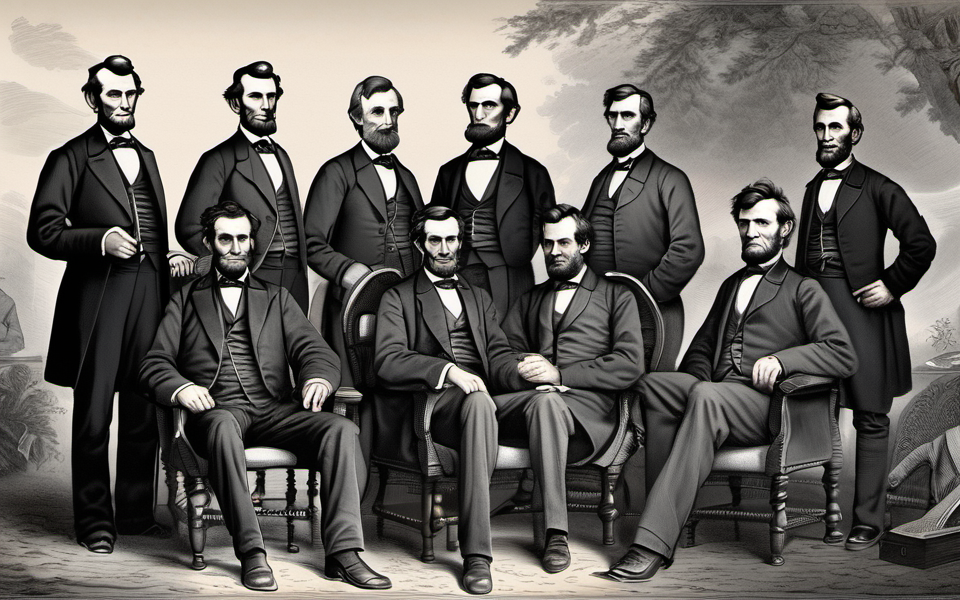What made Abraham Lincoln such a strong leader during the Civil War? Dive into the story of his courage, wisdom, and decisions that shaped America’s future!
A Humble Beginning
Abraham Lincoln wasn’t born into power or wealth. He was born in a small log cabin in Kentucky on February 12, 1809. Growing up, young Abe faced many hardships. His family was poor, and he had very little formal education. But that didn’t stop him! Lincoln was a curious boy who loved to read and learn. He borrowed books from neighbors and taught himself everything he could. This thirst for knowledge and self-improvement laid the foundation for his future success in leadership.
Rising to Prominence
Lincoln’s early career was marked by a relentless pursuit of justice and a burning passion for public service. He started out as a lawyer, known for his honesty and fairness, earning him the nickname “Honest Abe.” His reputation grew as he took on challenging cases, often defending the underdog. But Lincoln wasn’t just content with practicing law; he had bigger dreams. He entered politics, running for the Illinois state legislature and later for Congress. Despite facing numerous setbacks and defeats, Lincoln’s determination never wavered. His speeches on human rights and his knack for connecting with ordinary people began setting him apart from other politicians of his time.
The Road to Presidency
In 1860, America was divided, and tensions over slavery were at an all-time high. Lincoln, with his strong anti-slavery stance, decided to run for President. His campaign was driven by his belief in equality and unity. Despite being relatively unknown outside Illinois and lacking nationwide support at first, Lincoln’s eloquence, integrity, and vision won him the Republican nomination. On November 6, 1860, he was elected as the 16th President of the United States. It was a victory that came with immense challenges, as the southern states began to secede from the Union, marking the beginning of the American Civil War.
Leading a Nation at War
Once in office, Lincoln faced the unimaginable task of leading a nation torn apart by civil war. His leadership was tested as never before. One of his first and critical decisions was to send supplies to Fort Sumter, which was under threat from Confederate forces. This move, though controversial, demonstrated his commitment to maintaining the Union. Lincoln’s leadership during the war was characterized by his ability to communicate his vision and rally the public. His speeches, like the famed Gettysburg Address, galvanized the nation. He used simple yet powerful words to express profound ideas, redefining the war as a struggle not just for the Union, but for human equality and democracy.
Emancipation and Innovation
Perhaps one of Lincoln’s most defining moments as a leader was his issuance of the Emancipation Proclamation on January 1, 1863. This was a bold and monumental step in abolishing slavery. Though it didn’t immediately free all slaves, it changed the character of the war and gave a moral purpose to the Union’s fight. Moreover, Lincoln showed innovation in warfare strategy by supporting the use of new technology and tactics. He encouraged the development of ironclad ships and the use of railroads for troop movement, which significantly enhanced the Union’s military capabilities.
The Legacy of Lincoln
Abraham Lincoln’s leadership extended beyond his life. Tragically, he was assassinated on April 14, 1865, just days after the Civil War ended. Yet, his legacy endures. He is remembered as a symbol of equality, justice, and resilience. The 13th Amendment, which abolished slavery, was passed largely due to his persistent efforts. Lincoln’s leadership during one of America’s darkest times showcased his profound empathy, strategic foresight, and unwavering dedication to the principles of freedom and unity. His life continues to inspire countless individuals to rise above adversity and lead with integrity.






